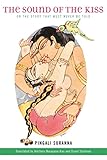The Sound of the Kiss, or The Story That Must Never Be Told / Pingali Suranna.
Material type: TextSeries: Translations from the Asian ClassicsPublisher: New York, NY : Columbia University Press, [2002]Copyright date: ©2002Description: 1 online resource (248 p.)Content type:
TextSeries: Translations from the Asian ClassicsPublisher: New York, NY : Columbia University Press, [2002]Copyright date: ©2002Description: 1 online resource (248 p.)Content type: - 9780231125970
- 9780231500968
- PL
- online - DeGruyter
- Issued also in print.
| Item type | Current library | Call number | URL | Status | Notes | Barcode | |
|---|---|---|---|---|---|---|---|
 eBook
eBook
|
Biblioteca "Angelicum" Pont. Univ. S.Tommaso d'Aquino Nuvola online | online - DeGruyter (Browse shelf(Opens below)) | Online access | Not for loan (Accesso limitato) | Accesso per gli utenti autorizzati / Access for authorized users | (dgr)9780231500968 |
Browsing Biblioteca "Angelicum" Pont. Univ. S.Tommaso d'Aquino shelves, Shelving location: Nuvola online Close shelf browser (Hides shelf browser)

|

|

|

|

|

|

|
||
| online - DeGruyter Active Social Capital : Tracing the Roots of Development and Democracy / | online - DeGruyter In Another Country : Colonialism, Culture, and the English Novel in India / | online - DeGruyter Randall Jarrell and His Age / | online - DeGruyter The Sound of the Kiss, or The Story That Must Never Be Told / | online - DeGruyter Reclaiming the Enlightenment : Toward a Politics of Radical Engagement / | online - DeGruyter Alterations of State : Sacred Kingship in the English Reformation / | online - DeGruyter The Chautauqua Moment : Protestants, Progressives, and the Culture of Modern Liberalism, 1874-1920 / |
Frontmatter -- Contents -- Acknowledgments -- Note on Pronunciation -- Introduction -- The Beginning -- Chapter 1 -- Chapter 2 -- Chapter 3 -- Chapter 4 -- Chapter 5 -- Chapter 6 -- Chapter 7 -- Chapter 8 -- Invitation to a Second Reading -- Appendix -- Backmatter
restricted access online access with authorization star
http://purl.org/coar/access_right/c_16ec
Composed in the mid-sixteenth century, The Sound of the Kiss, or The Story That Must Never Be Told, could be considered the first novel written in South Asia. Telugu, the language spoken in today's Andhra Pradesh region of southern India, has a classical literary tradition extending over a thousand years. Suranna's masterpiece comes from a period of intense creativity in Telugu, when great poets produced strikingly modern innovations. The novel explodes preconceived ideas about early South Indian literature: for example, that the characters lack interiority, that the language is formulaic, and that Telugu texts are mere translations of earlier Sanskrit works. Employing the poetic style known as campu, which mixes verse and prose, Pingali Suranna's work transcends our notions of traditional narrative. "I wanted to have the structure of a complex narrative no one had ever known," he said of his great novel, "with rich evocations of erotic love, and also descriptions of gods and temples that would be a joy to listen to."The Sound of the Kiss is both a gripping love story and a profound meditation on mind and language. Shulman and Rao include a thorough introduction that provides a broader understanding of, and appreciation for, the complexities and subtleties of this text.
Issued also in print.
Mode of access: Internet via World Wide Web.
In English.
Description based on online resource; title from PDF title page (publisher's Web site, viewed 02. Mrz 2022)


